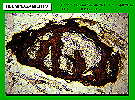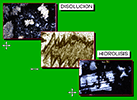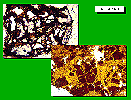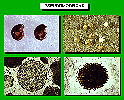![]() Transformation. This is a progressive alteration from one mineral
to another, so that the intermediate stages of the alteration
can be followed. In general, the contact areas between both minerals
are areas that show a gradual transition.
Transformation. This is a progressive alteration from one mineral
to another, so that the intermediate stages of the alteration
can be followed. In general, the contact areas between both minerals
are areas that show a gradual transition.

![]() Replacement.
This is an alteration of a mineral that is substituted by another
so that the primitive mineral is destroyed and it is replaced
in situ by the new mineral. In general, the contact between both
minerals is net, as one would logically expect from a dissolution
and a reprecipitation.
Replacement.
This is an alteration of a mineral that is substituted by another
so that the primitive mineral is destroyed and it is replaced
in situ by the new mineral. In general, the contact between both
minerals is net, as one would logically expect from a dissolution
and a reprecipitation.

![]() Segregation.
This is an alteration of a mineral to another with partial release
of one or more of the constituents, which recombine to give another
mineral. The primitive mineral is conserved degraded next to
the new mineral formed.
Segregation.
This is an alteration of a mineral to another with partial release
of one or more of the constituents, which recombine to give another
mineral. The primitive mineral is conserved degraded next to
the new mineral formed.

![]() Dissolution/Hydrolysis.
The primitive mineral dissolves or the hydrogen and hydroxyl ions attack the bonds that hold minerals together and the ions released do not
recombine in situ and another mineral is not formed. In general
the ions migrate to other places.
Dissolution/Hydrolysis.
The primitive mineral dissolves or the hydrogen and hydroxyl ions attack the bonds that hold minerals together and the ions released do not
recombine in situ and another mineral is not formed. In general
the ions migrate to other places.

![]() Neoformation.
This is a total alteration of the primitive mineral followed
by a new formation of another mineral. The primitive mineral
is completely destroyed and a new mineral appears, without there
being a genetic relation between them.
Neoformation.
This is a total alteration of the primitive mineral followed
by a new formation of another mineral. The primitive mineral
is completely destroyed and a new mineral appears, without there
being a genetic relation between them.
By its spatial distribution
![]() Pellicular. The alteration develops from the surface to the
centre of the mineral. The covering advances progressively until
it invades the nucleus of the primitive mineral.
Pellicular. The alteration develops from the surface to the
centre of the mineral. The covering advances progressively until
it invades the nucleus of the primitive mineral.

![]() Lineal.
The alteration progresses prominently in certain directions.
This is an alteration that develops in an orderly fashion, following
the least stable reticular planes.
Lineal.
The alteration progresses prominently in certain directions.
This is an alteration that develops in an orderly fashion, following
the least stable reticular planes.

![]() Irregular.
There is no distribution model of the alteration, as it develops
randomly.
Irregular.
There is no distribution model of the alteration, as it develops
randomly.


